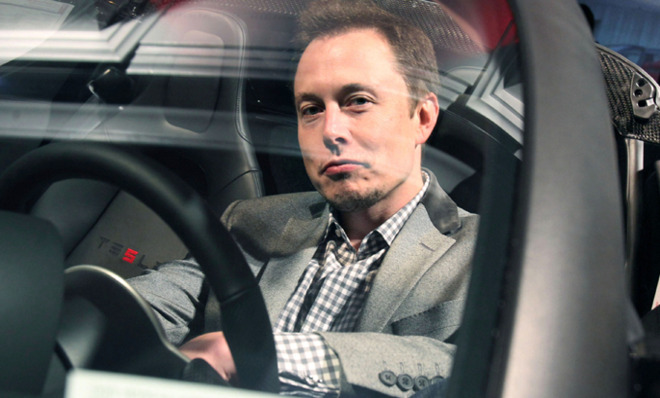Why Elon Musk should be Apple's next CEO
Imagine a solar-powered iPhone, or a Siri interface on an asteroid mining spaceship...

A free daily email with the biggest news stories of the day – and the best features from TheWeek.com
You are now subscribed
Your newsletter sign-up was successful
Last week, on a conference call with Tesla shareholders, the electric carmaker's CEO and PayPal founder Elon Musk discussed building a huge battery gigafactory, as well as Tesla's upcoming third-generation Model X. Then, immediately afterward, Musk dropped two bombshells in an interview with Bloomberg's Betty Liu: One, that Tesla was developing autonomous car technology; and two, that he had met with Apple.
"We had conversations with Apple," he said. "I can't comment on whether those revolved around any kind of acquisition." When Liu pressed Musk on what advice he might give to Apple about getting into the auto business, he responded, "I'd probably tell them that I think it's a great idea."
So maybe Tesla is a possible acquisition target for Apple, presuming that the iPhone maker might want to get into the auto business. But there's something else that Tesla has that Apple might want: Elon Musk himself.
The Week
Escape your echo chamber. Get the facts behind the news, plus analysis from multiple perspectives.

Sign up for The Week's Free Newsletters
From our morning news briefing to a weekly Good News Newsletter, get the best of The Week delivered directly to your inbox.
From our morning news briefing to a weekly Good News Newsletter, get the best of The Week delivered directly to your inbox.
Apple lost its founder and two-time CEO Steve Jobs to pancreatic cancer in 2011. And while Jobs' successor, Tim Cook, has done a solid job as CEO, Apple is still riding the crest of a wave of products and innovations from the Jobs era — the iPod, the iPad, the iPhone, the Macbook Air, and Macbook Pro.
Cook's expertise is in logistics and the management of supply chains, which was the right background to lead Apple for a few years of post-Jobs consolidation. But during this period, Apple has not introduced any revolutionary products. The iPad Air is much thinner and lighter than its predecessors, and iOS 7 is an aesthetic advance over iOS6, but these are incremental evolutionary advances in an era in which Apple's competitors — especially Google — are pushing potential game-changers like the eyepiece computer, Glass, and eating into Apple's market share of tablets and smartphones. Google is also leading the way in other fields, including self-driving cars and fiber optic broadband.
Meanwhile, Apple's fabled iWatch is still nowhere to be seen, and may prove to only be a niche product like Samsung's Galaxy Gear.
The risk for Apple is that the continued success of the company's Jobs-era products may be slowing Apple's desire to really innovate. Under Cook, Apple's hardware and software has become even sleeker, thinner, and sexier. But there has been no real push into new territory. While that might be profitable in the short term, in the long run that approach is stagnating.
A free daily email with the biggest news stories of the day – and the best features from TheWeek.com
To reverse this trend, Apple should look for an innovator in the mold of Jobs, a risk taker with a bold and distinct vision of the future, and a track record of bringing revolutionary products to market. Elon Musk can build Apple's computing and interface technology into new product areas — space technology, self-driving vehicles, transportation infrastructure, and renewable energy (and those are just Musk's current interests). Fundamentally, Musk and Apple complement each other quite well. Apple (like Microsoft before it) has a massive pile of cash, which it is struggling to invest, and Musk has a massive pile of futuristic visions to bring to market. Siri and iOS in self-driving electric cars? A solar-powered iPhone? 3D printed modular workstations? A Siri interface on an asteroid mining spaceship? Hand, meet glove.
Musk's long-term technological vision? Building our way off the planet: "An asteroid or a super volcano could destroy us, and we face risks the dinosaurs never saw: an engineered virus, inadvertent creation of a micro black hole, catastrophic global warming, or some as-yet-unknown technology could spell the end of us. Humankind evolved over millions of years, but in the last 60 years atomic weaponry created the potential to extinguish ourselves. Sooner or later, we must expand life beyond this green and blue ball — or go extinct."
This could also be a metaphor for Apple's current predicament. As we enter the era of ubiquitous computing — where processing power and communications are built into cars, glasses, watches, solar panels, and more — Apple must expand beyond workstations, laptops, tablets and smartphones — or go extinct.
John Aziz is the economics and business correspondent at TheWeek.com. He is also an associate editor at Pieria.co.uk. Previously his work has appeared on Business Insider, Zero Hedge, and Noahpinion.
-
 Switzerland could vote to cap its population
Switzerland could vote to cap its populationUnder the Radar Swiss People’s Party proposes referendum on radical anti-immigration measure to limit residents to 10 million
-
 Political cartoons for February 15
Political cartoons for February 15Cartoons Sunday's political cartoons include political ventriloquism, Europe in the middle, and more
-
 The broken water companies failing England and Wales
The broken water companies failing England and WalesExplainer With rising bills, deteriorating river health and a lack of investment, regulators face an uphill battle to stabilise the industry